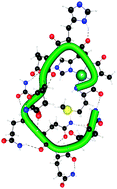Unexpected impact of the number of glutamine residues on metal complex stability†
Abstract
The emerging question which this study aims to answer is: what impact do glutamines have on the stability of metal–

Maintenance work is planned for Wednesday 1st May 2024 from 9:00am to 11:00am (BST).
During this time, the performance of our website may be affected - searches may run slowly and some pages may be temporarily unavailable. If this happens, please try refreshing your web browser or try waiting two to three minutes before trying again.
We apologise for any inconvenience this might cause and thank you for your patience.
* Corresponding authors
a
Department of Chemical and Pharmaceutical Sciences, University of Ferrara, via Fossato di Mortara, 27, I-44121 Ferrara, Italy
E-mail:
rmm@unife.it
b
Department of Chemistry, University of Wroclaw, F. Joliot-Curie 14, 50-383 Wroclaw, Poland
E-mail:
magdalena.rowinska-zyrek@chem.uni.wroc.pl
The emerging question which this study aims to answer is: what impact do glutamines have on the stability of metal–

 Please wait while we load your content...
Something went wrong. Try again?
Please wait while we load your content...
Something went wrong. Try again?
 Fetching data from CrossRef.
Fetching data from CrossRef.
This may take some time to load.
Loading related content
